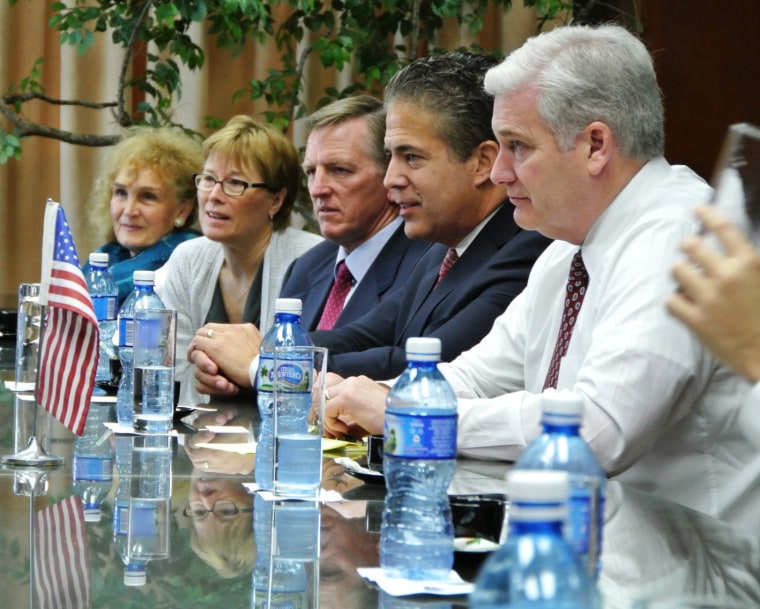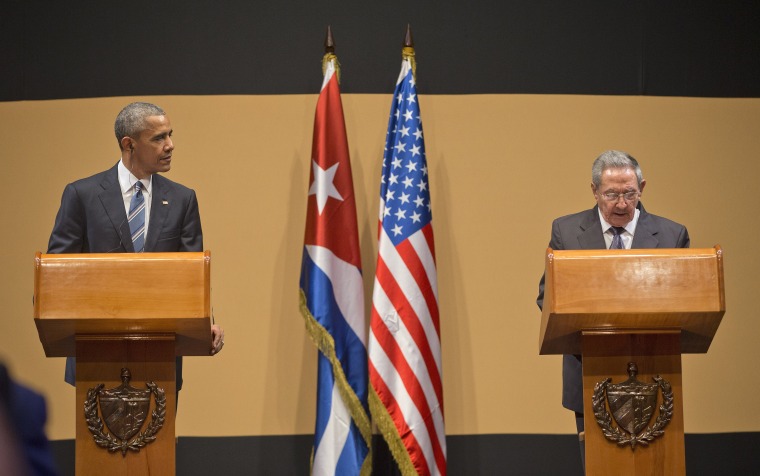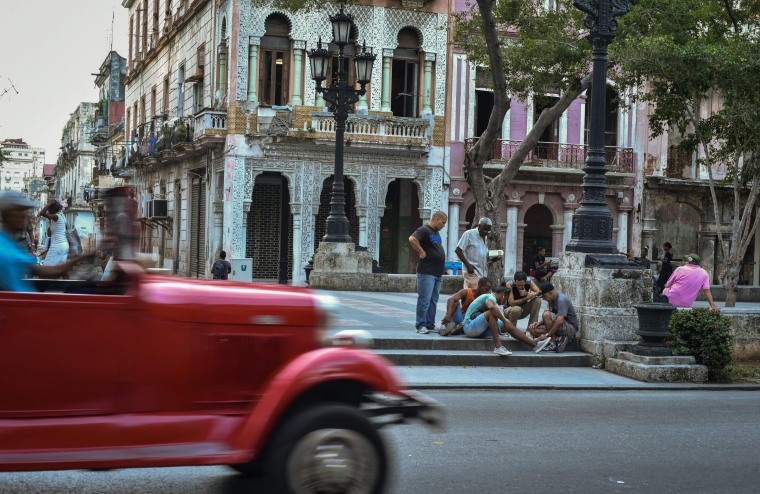Jet Blue and American flights loaded with tourists, businessmen, academics and journalists fly in and out of Cuba every day, perhaps the most dramatic and visible sign of the thaw in Washington-Havana relations since the restoration of relations nearly two years ago.
Beautifully restored and renovated hotels in Havana, including three hotels managed by the U.S. hotelier Starwood, cater to the throng of fast-spending travelers who are happily overrunning the Cuban capital, disgorging from spiffy tourist buses and packing restaurants and nightclubs, and turning the government-run tourism industry into a major source of revenue for the impoverished island.
“There’s a huge difference every time I go,” said Sarah Stephens, a top Cuba expert who is the executive director of the Center for Democracy in the Americas, a D.C.-based nonpartisan advocate of normalizing relations, in a conversation with me last week. “You can feel it. I’ve gone 14 times this year alone. I notice change every time I go.”
RELATED: Cubans Fear Trump to Reverse Opening, Army Drills Announced
But now all this change may come to a screeching halt.
Donald Trump’s election casts doubt on the new Cuba-U.S. policy after his promise during the campaign that he would reverse President Obama’s efforts to restore relations.
Cuba has answered mostly with public silence. President Raúl Castro messaged congratulations to Trump on his victory, but the official government newspaper Granma reported on Wednesday [Dec 9] that Cuba would hold military preparedness exercises for the first time in three years, suggesting that Havana may be gearing up for a hostile Trump administration.

“Is he really going to tell American Airlines and Jet Blue they can’t fly to Cuba,’’ Stephens asked, “and tell Cuban Americans they can no longer visit their families on the island, and tell church groups and students they can’t go to Cuba or use their cellphones to call their families at home if they go?”
“These are some of the people who are now invested, in economic and emotional terms, in the new policy," said Stephens. "He can take it back to square one, but that’s a choice with pretty significant consequences.”
Over the past 15 years, Stephens has led over 60 fact-finding delegations to Cuba including members of Congress, economists, educators, artists, academics and experts. Unlike most visitors to Cuba, her delegations gain access to senior Cuban officials and ministries and include leading American business executives and politicians like Senator Jeff Flake, Republican of Arizona, and Gov. Andrew Cuomo of New York, who have major impact on evolving Cuba policy.
That two-year-old policy, the product of Obama’s executive orders, has restored diplomatic relations between the two nations and relaxed U.S. economic sanctions on the island. Americans are traveling to Cuba more easily. Commercial flights are increasing and are set to total some 110 a day. American businesses and corporations are gauging their prospects in a largely untapped Cuban market. Americans can now legally bring back a haul of Cuban cigars and rum, the two most popular Cuban souvenirs.
And yet, there’s a long road ahead. Cuba has made it repeatedly clear that it will not consider normalization complete until the U.S. Congress lifts the trade embargo that the U.S. imposed in 1962.

In this new Trump era, with the control of Congress in conservative Republican hands, lifting the embargo seems a long way off.
“We will cancel Obama’s one-sided Cuban deal, made by executive order, if we do not get the deal that we want and the deal that people living in Cuba and here deserve, including protecting religious and political freedom,” Trump told Floridians during the campaign, a preview of the uncertain future of Cuba-U.S. relations in the next four years.
RELATED: Trump Says Special Access to U.S. for Cuban Immigrants Is Wrong
But, of course, setbacks and reversals the U.S. side are not the only obstacles to normalizing relations.
“Things in Cuba are moving at a glacial pace,’’ Stephens told me. “Expectations are so different, perceptions are so different.”
She calls Cuba one of the most bureaucratic countries in the world. “The bureaucracy is ridiculous. It requires new ways of doing things. Government offices and agencies are understaffed. There’s a tangle of regulations for new businesses.”
Stephens was at the International Trade Fair in Havana earlier this month, where deals with foreign investors could have been made, but the Cuban government stalled and nothing moved forward.
RELATED: Through Program, Cuban American Millennials Visit Island for 1st Time
“Psychologically, it’s a big change for Cuba,’’ she admitted. “It’s still the party who governs the country. The party isn’t going away.”
RELATED: In 'Historic Moment,' Cuba Opens First U.S.-Operated Hotel
That’s cold reality, but there’s this new reality, too.
“I was not able to get a hotel room last week, the entire city was booked!” she exclaimed. But she discovered a boutique hotel in El Vedado, a onetime upper-class neighborhood near the Malecón, the oceanside boulevard. Someone had restored a house and quietly turned into a small hotel. “Nothing like this existed until now.”
In a country that has had little internet access, the government is now allowing internet hot zones in parks and some neighborhoods, and on another level, there’s a notable change in the way top government officials on both sides interact socially.
“It used to be that Havana and U.S. officials didn’t mix at cultural or social events. Now I see top Havana government officials showing up together with American officials.”
It seems fitting that on Sunday night, Nov. 13th, the Center for Democracy in the Americas, which she founded in 2006, celebrates its tenth anniversary at a $250-$350-per-person festivity in Washington headlined by the well-known Cuban singer-songwriter Carlos Varela and the Grammy-winning American musician Dave Matthews.
“As we process the results of the presidential election, many of us are looking for places and spaces to come together,” Stephens said, quoting Varela’s song, “There are those who build walls, and those who open doors.”
